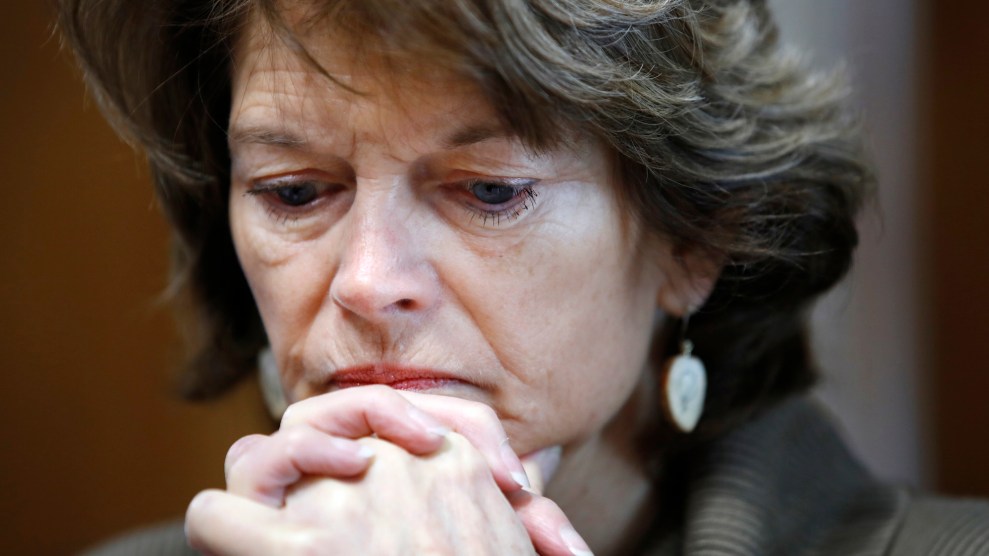
Jacquelyn Martin/AP
With the Senate’s vote on Supreme Court nominee Brett Kavanaugh approaching, all eyes are once again on a small group of undecided senators, including Alaska’s Lisa Murkowski. It’s familiar territory for the moderate Republican, who last year faced backlash for bucking her party on the attempted repeal of the Affordable Care Act.
But as advocates on both sides of the nomination battle turn up the heat, the sexual misconduct allegations against Kavanaugh have brought an extra level of pressure from Murkowski’s constituents in Alaska, which has the nation’s highest rates of reported rape and where a recent court decision has mobilized local survivors—including the Alaska Native women hardest hit by the state’s sexual assault epidemic.
In August 2017, Justin Schneider, a 34-year-old air traffic controller, offered to drive a 25-year-old Alaska Native woman at a gas station to her boyfriend’s house, according to the Anchorage Daily News. Instead, he drove her to a dark street, choked her until she passed out, and ejaculated on her. The woman believed “she was going to die,” a detective on the case noted in an affidavit. Prosecutors offered Schneider a deal: Plead guilty to a single charge of second-degree assault and receive a two-year prison sentence—one year already served under house arrest, and the second year suspended as he completes the terms of his probation.
Anchorage Superior Court Judge Michael Corey approved that deal last month during a widely criticized sentencing hearing during which Schneider never expressed remorse or noted the impact the crime had on his victim, KTVA reported. He walked out free, subject only to three years’ probation and sex-offender treatment.
The case has had a devastating impact on local survivors, says Jennifer Brown, development manager for Standing Together Against Rape, an Anchorage rape crisis center. Brown says her organization has received an uptick in hotline calls in recent weeks, with the outcome of the Schneider case landing at the same time as the multiple sexual assault allegations against Kavanaugh. “A lot of [the calls] are related to people being triggered,” Brown says. “Our volunteer responders have done a lot of work with folks about self-care. But you almost can’t avoid the news. It’s everywhere.”
Elizabeth Williams, an Anchorage-based social worker who is now mounting a campaign to get Alaskans to vote “no” on Judge Corey’s retention election in November, says recent news has motivated hundreds of supporters to endorse her effort online or donate money to unseat the judge. “We’ve got this backdrop of just the rage of women, that I think we’ve always had,” she says. “But we’re channeling it. We’re organizing the rage of women. This is just a local way of doing that.”
Since launching her campaign, Williams says she has received hundreds of Facebook messages from Alaska Native women with stories about being strangled or sexually assaulted. Many of the women shared the reasons why they didn’t report—often because they felt their safety as Alaska Native women wasn’t taken seriously, or that they wouldn’t be believed, or that they would be stereotyped as unreliable or poor witnesses. “They’re upset by the sentence, but they’re not surprised,” says Williams, who is white. “You can’t ignore race in this. I strongly believe that if I had been the victim, that man would have walked away with years in jail.”
Adeline Raboth, a survivor from Fairbanks, made much the same point at press conference protesting Kavanaugh outside Murkowski’s Washington, DC, offices last week. “Being raised in the Alaskan Native community in my age group, I’m in my 70s, we were taught not to tell about sexual assault,” Raboth said, according to Rewire News. “Most of the time, we would be blamed for being provocative in some way.”
According to FBI statistics, 116.7 rapes per 100,000 residents are reported to authorities in Alaska—65 percent more than in the next highest state (actual numbers are almost certainly far higher, given the vast underreporting of sexual violence to police). A recent report from the state’s Department of Public Safety revealed that 42 percent of felony sex offense victims in 2017 were Alaska Native women, mostly around Anchorage and in the state’s isolated western reaches. Nationally, more than four in five American Indian or Alaska Native women have experienced sexual assault, intimate partner violence, stalking, or psychological aggression at some point in their lives; one in three endured at least one of these forms of violence in the past year, according to a 2016 study.
None of this should be news to Murkowski. As one of the Senate’s few pro-choice Republicans, she has a reputation as an advocate for women’s issues, and according to the Brookings Institution, she introduced two bills this summer designed to increase survivors’ access to critical care and fight human trafficking in Native communities.
What’s more, Alaska Natives’ opposition to Kavanaugh was established even before the sexual assault allegations came to light. Tribal and legal officials pointed to Kavanaugh’s potential to decimate federal protections for subsistence fishing rights, voting rights, and climate change regulations. State lawmakers representing tribal and rural interests criticized his record on access to health care. And Sen. Mazie Hirono (D-Hawaii) drew attention to past writings in which Kavanaugh argued that Native Hawaiians might not qualify for constitutional protections as Native Americans—leading the Alaska Federation of Natives, which represents about 20 percent of the state’s population, to come out powerfully against him.
But following the allegations, tribal leaders added their voices in support of Kavanaugh’s accusers, citing their experience with dealing with sexual violence in their own communities. “Violence against our Native women and children in Alaska is not part of our culture, but is unfortunately an epidemic,” wrote the Bering Sea Elders Group, which comprises representatives of 39 tribes from Western Alaska, in a resolution against Kavanaugh soon after Christine Blasey Ford’s name and story were revealed. “It is our way to value every individual and their words, and a woman’s word is evidence.”


















